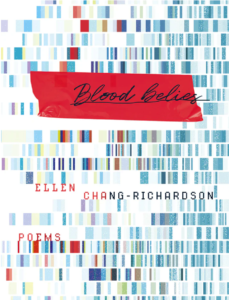By Frances Boyle
Blood Belies
by Ellen Chang-Richardson
Wolsak & Wynn (2024)
Blood Belies is Ellen Chang-Richardson’s first full-length poetry collection after six chapbooks (solo and collaborative) published over the past few years, an impressive output at any stage of a writing career but even more so this early on. Elements that distinguish their previous work—ekphrasis, confronting historical and contemporary racisms, the links between concussion and memory—are all present in Blood Belies but a book’s larger scope allows for expanded and even elongated explorations of these topics and the connections between them. Minimalism and visual elements increase the impact of the writing. Incorporating silences and the visual equivalent of static between stations on a dial, Chang-Richardson’s poems move between the overtly political and the familial, interweaving the two.
Two long poems, “Storm Surge” and “tundra mist” carry significant emotional weight in the told and retold stories of the speaker’s father’s youth, notably his escape from Cambodia as a refugee, and in the traumas passed down to / inherited by his children, the silences and alienation, where the family is “existing as practically strangers.” (19). “Bà would only share his darkest stories /in the middle of a summer storm” (22); “I … feel the p u l s e of my father’s secrets in my / veins. enclosed. safe. claustrophobic. free” (25).
Length—and emotional weight—is also given to nuanced examinations of anti-Asian racism. Another pair of poems, “urban facts 2.0” and “resonate this” present historical information, including direct quotations from a 1902 Royal Commission, about the long litany of inequities at the legislative level (the Chinese Exclusion Act, the head tax). Chang-Richardson juxtaposes these snapshot history lessons against racist schoolyard taunts endured by a younger version of the speaker and slurs directed at people of Asian heritage in the early days of the Covid 19 pandemic in Canada and the U.S.
Integrated with these two major themes are ekphrastic poems, including one on the powerful art of Edward Burtynsky, which is a segue into a number of poems on the environment and climate change. Threaded throughout the book are echoes of concussions and brain flares (which Chang-Richardson also explored in their Apt. 9 chapbook “Concussion Baby”). Blood Belies is spare, with numerous pages given over largely to commas, periods and dashes or plus/minus symbols, sometimes with a word or two, sometimes with none. Chang-Richardson has explained that these marks are intended to reflect the way their brain and senses experienced the world during flare-ups following a concussion, with the result being this “long-form glitch running undercurrent to the entire collection” (interview in Room Magazine).
These and other typographical elements operate to amplify silences and hesitations, often oblique yet none the less powerful for that, with silences sometimes as profound as words. Some text is presented on facsimiles of notebook pages and ledger paper. There are hints of images and phrases redacted or blacked out, as well as shaded grey-scale words, and repetitions, suggesting thoughts and memories mulled over and finally spoken. The design element in the poem “urban facts 2.0”, where circles listing dates surround more traditionally laid out text (15-17) is echoed in similar semi-circles of dates in “rorscharch” itemizing the speaker’s multiple concussion experiences (43-44). This helps to further integrate the book’s themes and elements by, as Chang-Richardson has said “looping trauma through other trauma” (Room Magazine interview).
The imagistic language Chang-Richardson employs is more often simile than metaphor. They use “like” comparisons very effectively such as in “My fuh8 ather clings to the fantasy like a / drowning man clings to seaweed” (32) and in the multiple instances where “like” appears on a page with only punctuation marks accompanying it. But there are also sizzling metaphors: “we scratch surface until wounds burst / your touch is cold against my socks” (64); “my stomach pushes my insides / in two billion knots of plastic rouge” (59).
Unsurprisingly, given that Chang-Richardson is one of the founders and curators of the multidisciplinary Ottawa-Gatineau Riverbed Series, which features musical and visual performances as well as literary ones, the visual and performative elements of the book are key. The dots and dashes in Blood Belies translate to performance via a bespoke artisanal instrument (a beautifully sanded board) that Chang-Richardson has played at their readings, to eerie and compelling effect.
Near the centre of the book, a poem fragment with visual elements (grey-scale and black text, shaped as a maple tree) is splayed over two pages. This feels emblematic of what might be considered the almost folded-over nature of the book. Two spare poems bookend the collection, one before the start of the first section and another following the final section. Similarly, the second poem in each of the two pairs of poems mentioned earlier (“Storm Surge” / “tundra mist” and “urban facts 2.0” / “resonate this”) constitutes a revisiting, a reassessment of the earlier poem of the pair. Memory—fragmented and fallible—and our experiences of it open and close like the covers of a book.
The three sections in Blood Belies are titled with imperatives, in the same cursive writing that graces the red tape title banner on the book’s cover: “Record”, “Chew”, and “Rework” is what we are exhorted to do, and what we are persuaded the speaker has done. This, Blood Belies insists, is how we might engage with facts and stories, personal and political, reconciling silences and memory.
Frances Boyle is the author of three poetry books, most recently Openwork and Limestone (Frontenac House 2022). Her 2014 debut collection, Light-carved Passages, was republished in 2024 by Doubleback Books. Her other books include Seeking Shade, an award-winning short story collection (The Porcupine’s Quill, 2020) and Tower, a novella (Fish Gotta Swim Editions 2018). Recent and forthcoming publications include work in The Fiddlehead, The Honest Ulsterman, Consilience, Dreich, Freefall and The New Quarterly. Originally from Regina, Frances has long lived in Ottawa. For more, please visit www.francesboyle.com and follow @francesboyle19.

